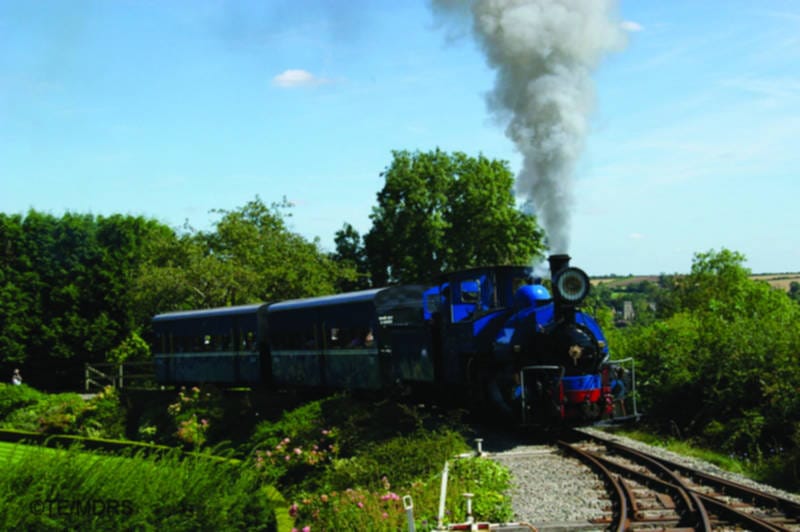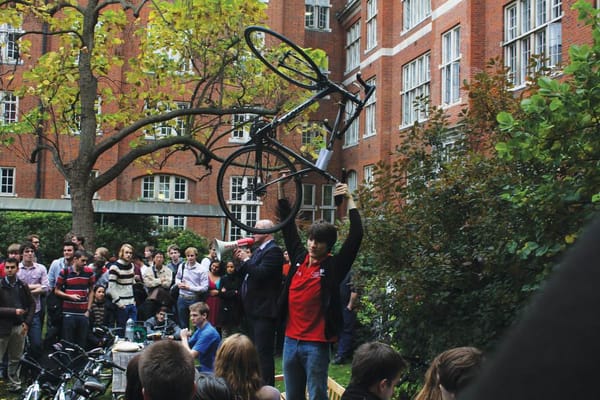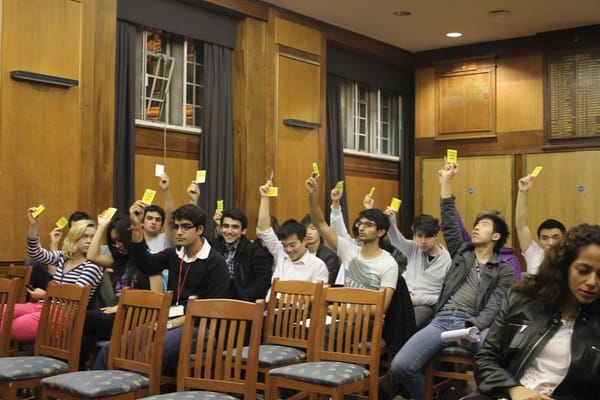Interview: Adrian Shooter
Alice Yang talks to the Chairman of Chiltern Railways about careers in industry

Behind a large brown door in Marylebone station are the offices of Chiltern Railways, the UK’s fastest growing train operating company over the past 15 years. A few minutes after being shown into a modest meeting room on the top floor of the building, Adrian Shooter, CBE and Chairman of Chiltern Railways, enters, apologising for the delay.
Mr Shooter’s story is well known. Having effectively managed Chiltern Railways for over 20 years, during which he successfully completed a management buyout of the company, it now runs as one of the most punctual UK train operators.
Mr Shooter’s interest in the rail industry was sparked by the debate surrounding the Beeching Report, released when Mr Shooter was still at school. The report called for the closure of a third of Britain’s train stations and the reorganisation of existing tracks in order to fully reshape Britain’s railways. This prompted much controversy and general public criticism, but young Adrian agreed with Lord Beeching’s propositions comparing the scenario to a rose bush: “you have to prune off the dead branches and encourage the new shoots of growth.”
After obtaining a degree in Mechanical Engineering from North Staffordshire Polytechnic, Mr Shooter joined British Rail in 1970 as an Engineering Management Trainee. During his 12 years in the role, Mr Shooter primarily worked on developing and improving the operations and efficiency of the company.
“It was a huge company with exciting changes taking place so there was real opportunity for young engineers to be involved. At the time, the IC 125, which was the fastest diesel train in the world at the time and still runs now, was being brought in meaning that we had to build new depots as well as recruit and retrain 300-odd people. Through the whole 12 years, my job was about bringing change and modernising the way we do things, which was really exciting.”
Mr Shooter recalls his first direct contact with British Rail passengers in Harpenden following 2 years of constant disruptions to the railway system due to track and station upgrades: “The commuters were pretty cross as the whole journey had been thinned out and lots of replacement buses had been used. When I went to give a speech at their village hall, packed with over 300 people, they were baying for blood.
We tend to recruit people for attitude and then train them for skills.
“To start off with, it was a big shouting match, but then some people in the audience turned on the people who were shouting and said ‘Hey look, give the bloke a chance.’ We were just about to bring in new trains and a new service, so I told them that if it doesn’t improve over the next couple of months, then they’d be entitled to be after my blood. In the end, it was really good because a few of them then took me down the pub for a drink and we delivered what we said we would – improving our punctuality to the best in the country – meaning that these commuters were fully satisfied with the service.
“I really enjoyed that because it’s really important that engineers realise they can make changes. To be interfacing directly with customers – the people who are going to put their hands in their pockets to pay for what you’re doing – doesn’t half concentrate your mind.”
Following the legislation in 1993 to privatise railways, Mr Shooter was asked by the Chairman of British Rail to come to Chiltern Railways and make it into a separate company – a completely self-standing financial entity.
“This was more difficult than it sounds. There were contracts and agreements to be written out. Who was to be responsible for looking after the stations? What would happen if there were a conflict between running times of passenger and freight trains? It got much too complicated but, nevertheless, worked out in the end. The next step was to sell the company.”
Having worked for so long with his management team on building up the company, Mr Shooter felt that they could run it as well as anyone else, and so decided to try and undertake a management buyout – a process that is very rarely successful.
“It’s rather interesting as I was actually working for British Railways who were selling Chiltern Railways, so I had a conflict of interest. I had to do three things. Firstly, I had to continue running the railways in a proper, prompt and safe way. Secondly, on behalf of my employer, I had to sell the business – it was competitive and we had 13 companies bidding for it. I had to explain to prospective purchasers how the company worked, what they would need to do and the money they should pay for it. Thirdly, in my own time, I had to work out, with my team, how to buy it.”

After formally winning the franchise in 1996, Mr Shooter and his team devised a long term plan for the company which is still on-going today.
“We’ve grown the business faster than any of the other companies. We’ve done that because railways, like many other businesses, survive on their customers. You’ve got to find out what customers want and, importantly, what they’re prepared to pay for.”
Mr Shooter rounds up his story by explaining “success in business is all about the people. It’s about making sure you have the right people in the right teams with a very clear objective about what you’re trying to achieve. If you look at something that’s gone wrong, one of the first questions you might want to ask is ‘was there a clear objective?’ Secondly ‘did all the people who were involved in that understand the objective?’ And thirdly, ‘did they buy into it?’”
The advice I would give is about honing your people skills.
Regarding hiring people to make up such a team, Mr Shooter looks for “people who are enthusiastic and are committed to working as a team. We tend to recruit people for attitude and then train them for skills. I want people who are going to come here and look as if they are enthusiastic and interested and want to get on and do stuff, but tempered with whatever are the appropriate qualifications for whatever the job may be.”
Added to this, Mr Shooter’s passion for the rail industry is reflected in his ownership of a Darjeeling Himalayan Steam Locomotive, along with 600 yards of railway track in the back yard of his Bicester home. “I’ve always quite liked two-foot gauge railways and when I became aware that this would be for sale I knew it would be the only Darjeeling Himalayan Steam Locomotive ever likely to come out of India, so I brought it to the UK, had it overhauled and got some replica coaches that go with it.” However, neither being awarded a CBE nor owning a Darjeeling Himalayan Steam Locomotive in his back garden are classed by Mr Shooter as his greatest life achievements to date. “The thing I’m most proud of, is that over the years, we’ve managed to develop Chiltern Railways into something which is a much more valuable contribution to the community than it was.”
Taking into account his great list of achievements and contributions to the rail and engineering industry, I ask Mr Shooter what advice he would give to current students, and what skills he feels are most important for success.
“They need two sorts of skills. If they’re mechanical engineers, they’ve probably embarked upon that because they have some interest in machines and how machines work. The real advice I would give to them is about honing your people skills.
“Once at university, make sure you find yourself in one of the various extra curricular activities where you have the opportunity to get on the committee for it, and volunteer for some kind of role where you’ll have to do things and organise people. Even if you don’t feel comfortable doing it, get yourself as social sec or the like.
“Make sure you spend time in companies in your vacations. Write to companies or whatever connections you’ve got and see what it’s actually like at work.
“On top of that, study hard and get the best possible degree you can.”








